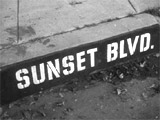
|
Sunset
Blvd. (1950) (aka Sunset Boulevard)
In director Billy Wilder's classic
black comedy and noirish drama about a doomed romance with a femme
fatale in Tinseltown - it was a gothic masterpiece about "behind
the scenes" Hollywood, self-deceit, spiritual and spatial emptiness, and the price of fame,
greed, narcissism, and ambition:
- in the shocking twist beginning -
there was a view of the posthumous, disembodied narrator - a cynical,
down-on-his-luck B-movie hack screenwriter Joe Gillis (William
Holden), who was sent to his doom and spoke beyond the grave (in
voice-over) as a dead man corpse floating face-down in a swimming
pool in a rotting Beverly Hills mansion. His voice-over narration
was delivered cynically and crisply in a film-noirish style,
by the disembodied dead man
- at about 5 am
in the morning, motorcycle officers, followed by police cars with
sirens blaring, carrying a homicide squad, detectives and reporters,
rushed down Sunset Boulevard to a mansion in Beverly Hills in the
10,000 block. There, they found a dead body floating face down
in a swimming pool:
Yes, this is Sunset Boulevard, Los Angeles, California.
It's about five o'clock in the morning. That's the Homicide Squad
- complete with detectives and newspapermen. A murder has been
reported from one of those great big houses in the ten thousand
block. You'll read about it in the late editions, I'm sure. You'll
get it over your radio and see it on television because an old-time
star is involved - one of the biggest. But before you hear it all
distorted and blown out of proportion, before those Hollywood columnists
get their hands on it, maybe you'd like to hear the facts, the
whole truth. If so, you've come to the right party. You see, the
body of a young man was found floating in the pool of her mansion
- with two shots in his back and one in his stomach. Nobody important,
really. Just a movie writer with a couple of 'B' pictures to his
credit. The poor dope! He always wanted a pool. Well, in the end,
he got himself a pool - only the price turned out to be a little
high.
- the dead man Joe Gillis recounted in flashback
(with cynicism) about a six-month period during which he struggled
to produce screenplays that would sell, to meet the demands of
the industry. Joe was introduced as a destitute, indebted, down-and-out,
depressed $35/week newspaper copy desk writer from the Midwest
(Dayton, OH), who was working as a screenwriter in his one-room
Alto Nido apartment house in Hollywood
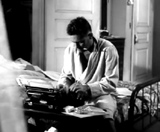
|
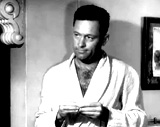
|
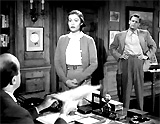
Joe's Rejected Screenplay at
Paramount
|
|
Joe Gillis Hack Screenwriter - Six Months Earlier
|
- he had failed to have his most recent screenplay for
a baseball/gambling picture (Bases Loaded) approved by Paramount
Pictures' producer Sheldrake (Fred Clark) after young and pretty
script reader Betty Schaefer (Nancy Olson) offered a harsh criticism
of his script as formulaic: ("I wouldn't bother...It's just
a rehash of something that wasn't very good to begin with....I just
didn't think it was any good. I found it flat and trite")
- while fleeing in his car from repo men who wanted to
take back his 1946 Plymouth, Joe happened to have a flat tire and
was able to pull into the driveway of a decaying, seemingly-deserted,
neglected "white elephant" mansion in the 10,000 block
of Sunset Boulevard. He hid his car in the empty garage of the 1920s
home, and then heard a woman wearing dark glasses behind a slatted
shade beckoning him from the house: "You there! Why are you
so late? Why have you kept me waiting so long?" (He was mistaken
for the undertaker who was about to arrive with a coffin for her
recently-deceased pet chimpanzee.)
|
Joe's Fateful Rendezvous
With Femme Fatale Norma Desmond
|
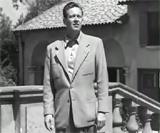
|
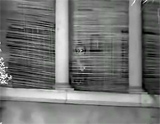
|
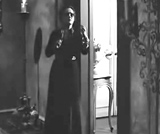
|

|
|
"You there! Why are you so late? Why have
you kept me waiting so long?"
|
- after being summoned inside by an unidentified butler,
he ventured upstairs where in the corridor, he met the home's owner
- she was dressed in black house pajamas, wearing sunglasses and
she had a leopard-patterned scarf wrapped like a turban around her
head. She brought him into her bedroom to view her dead chimpanzee.
During their initial conversation, he recognized her, and commented
about how big she was in silent pictures: "You're Norma Desmond.
You used to be in silent pictures. You used to be big." In one
of the filmdom's most quoted lines, she bristled
back indignantly about the rise of the talkies and the end of the
silent era:
I am big. It's the pictures that
got small.
- she was the wealthy, aging,
reclusive Norma Desmond (Gloria Swanson), Paramount's greatest
film star during the silent era ("an old time star...one of
the biggest"), but now
a relic forgotten for the past twenty years. She boasted about a
script she was writing about the Biblical figure Salomé for
her screen comeback, hopefully with director Cecil B. DeMille. She
watched him intensely as he read her hand-scrawled
script for her triumphant re-entry ("return") into film-making
("she sat coiled up like a watch spring - her cigarette clamped
in a curious holder")
- he bluntly realized
that her script - that desperately needed editing - was a "silly
hodgepodge of melodramatic plots" that
required more dialogue, and "certainly could use a pair of shears
and a blue pencil." She hired him on the spot to finish her
script, for $500/week, and insisted that he live on the premises.
Joe was able to satisfy the thirsty illusions of immortality of the
aging, waspish, megalomaniacal fading, ex-silent film star queen
Norma Desmond.
- for the first night, Joe stayed
in the room over the garage, and upon awakening found that his 3
months' overdue rent had been paid and all of his possessions had
been brought to the room by her faithful butler/ex-husband Max (director
Erich von Stroheim). Joe felt irretrievably trapped, but realized
he needed the money and editing job, so he acquiesed to stay for
a few more weeks. She was overly observant of him: ("She was
around all the time, hovering over me, afraid I'd do injury to that
precious brainchild of hers")
- there were numerous short
scenes interwoven, including the moonlight funeral/burial and last
rites for Norma's pet monkey in a baby coffin in her backyard, and
the scenes of Norma watching screenings of her old silent movies
projected in her living room (including Swanson's own disastrous
and uncompleted Queen Kelly from 1928), when she proclaimed: "We didn't need
dialogue. We had faces. There just aren't any faces like
that anymore. Maybe one, Garbo. Oh, those idiot producers. Those
imbeciles. Haven't they got any eyes? Have they forgotten what
a star looks like? I'll show them. I'll be up there again, so help
me!" Some days, there
was a bridge game in the living room with her
old "waxworks" actor-friends from the silent era
- Max would chauffeur Norma and Joe
around town in her fancy, open-air handmade 1929 Isotta-Fraschini
car. Norma made him her "kept man" by taking him to an
exclusive mens' shop to acquire fashionable clothing, including a
tuxedo. On one occasion, the pushy clerk insisted that Joe select
the more expensive vicuna rather than camel's hair since Norma was
paying the bill: "Well, as long as the lady's paying for it, why not take the vicuna?"
During California's rainy season, Joe was moved into her decaying Sunset
Boulevard mansion - into the bedroom of one of her ex-husbands. Max
admitted to Joe that he had kept up Norma's fanciful delusions about
her stardom by sending her fan mail letters that he had written.
- during an aborted New Years' Eve party that she had hosted for only Joe
and herself, Joe abruptly left to escape her smothering and controlling
nature after telling her: "Has it ever occurred
to you that I may have a life of my own?...What I'm trying to say
is that I'm all wrong for you." He departed after she slapped
him across the face. Later that evening after she attempted to commit
suicide by cutting her wrists with a razor, Joe felt obligated to
return to her after he phoned and learned of her suicide attempt.
Once back in the mansion, he thanked her: "You've been good
to me. You're the only person in this stinking town that has been
good to me." Although further entrapped, Joe decided to remain
with her as her bought lover.
- at the mansion one day when she sensed that Joe was bored, Norma transformed herself
into a Mack Sennett Bathing Beauty and then into Charlie Chaplin
as The Tramp (with black mustache, derby hat, and cane), part of
her playful "live show" entertainment
for him.
- Norma finally engaged in a much-anticipated meeting
with director Cecil B. De Mille on the set of Samson and Delilah
(1949), after deciding to be chauffeured to the set in her
large touring car - without an appointment. She was deluded into
believing that De Mille would naturally produce her triumphant
comeback movie. Upon her arrival, De Mille, on sound stage 18 in
jodhpurs and boots, was informed through a succession of assistants,
that Norma (who "must be a million years old") was on her way. The great director
reacted with some sympathy for her as a destroyed victim of Hollywood's
sound revolution, knowing that her youthful stardom was ruined by
press agents "working overtime" as she aged. Pioneering
Hollywood director De Mille greeted her at the sound stage door when
she arrived in the limousine: "Well, hello, young fellow...It's
good to see you." For a moment, Norma basked in the light of
a spotlight and returned in her mnd to her days as a silver-screen
beauty, although the studio had really only contacted her to inquire
about renting her luxury vintage 1929 Isotta Fraschini car for a
Crosby picture. However, Norma was completely deluded about working
again with De Mille: "We'll work again, won't we, Chief? We'll
make our greatest picture....I just want to work again. You don't
know what it means to know that you want me."
- although
she was exhilarated, De Mille had no intention of filming Norma's
script with her starring role. As Joe stated in voice-over, the vain
Norma prepared vigorously to be in a starring role: "She was
absolutely determined to be ready, ready for those cameras that would
never turn."
- while ensnared by the demented
Norma, opportunistic Joe began to have genuine feelings for 22 year-old
clean-cut, Paramount script reader Betty Schaefer; he would
sneak off and work with her on their own script during late-hours
in her studio office. He told her that she was extremely tempting
to get involved with - as a "smart girl. Nothing like being
twenty-two. And may I suggest that if we're ever to finish this story,
you stay at least two feet away from me. Now the first time you see
me coming any closer, I want you to take off a shoe and clunk me
on the head with it." (Earlier in the film, he had playfully but
affectionately kissed her on the nose - after she told him that she
had a nose job)
- after being showered
with bribes (clothes, money, flattery and other gifts), Joe had become
quickly spoiled and ensnared in Norma's web of delusion - and death
trap. His budding relationship (and long hours away from her) with
Betty was threatening to Norma, who inevitably became jealous and
delusional and accused him of being unfaithful with another woman,
especially after she found his manuscript for a co-scripted 'UNTITLED
LOVE STORY" written
with Betty Schaefer.
- Joe's extra-curricular associations also would become
a concern for Betty's fiancee Artie Green (Jack Webb) - especially
when Betty confessed that she was no longer in love with her fiancee.
(Betty: "Of course I love him. I always will. I'm not in love
with him any more, that's all." Joe: "What happened?" Betty: "You
did.") Joe spontaneously took her in his arms and they kissed,
obviously in love
- to reveal Joe's hidden life
and disrupt his relationship with Betty, Norma phoned to inform her
and ask: "Do you know where he lives? Do you know how he lives? Do you know what he lives
on?" Her intention, under the guise of helping her, was to show how Joe
had been deceiving her: "I'm trying to do you a favor. I'm trying
to spare you a great deal of misery." Joe intercepted the call
and invited Betty to see where he lived, in person. Joe learned that
Norma, tormented by his relationship, had bought a revolver and contemplated
killing herself.
- during a climactic visit by
Betty to the mansion, Joe admitted he was a dependent gigolo and
'kept man' under contract who lived off Norma's wealth. Betty was
willing to forgive him and leave with him, but Joe stressed his predicament:
"I've got a good deal here. A long-term contract with no options.
I like it that way. Maybe it's not very admirable." He sadly
terminated their relationship by showing her the exit, and encouraging
her marriage to Artie.
- in front of Norma, Joe began to pack
up and return to Dayton, Ohio (for his copy desk job) and she became
distraught and cried out madly: ("I can't face life without
you. And you know I'm not afraid to die"). He also burst Norma's
delusions about her comeback: "The audience left 20 years ago
- now face it!"
- and he told her the truth about her fan mail and studio visit. Threatening
suicide and shouting out: "No one ever leaves a star,"
the temporarily insane Norma turned her gun on him and shot him twice
in the back and once in the stomach as he walked away toward the outdoor
pool. He tumbled backwards and capsized into the water, face-down
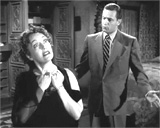
Joe's Decision to Leave Norma
|
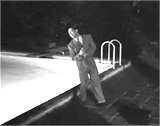
Joe Shot to Death by Norma at Poolside
|
- after
shooting Joe in a "crime of passion",
the police and camera news-crews ("the heartless so-and-sos") arrived
by daybreak. Once the crazed and deluded woman heard that there were "Cameras!",
she was persuaded and coaxed to quietly come downstairs to a waiting
car through a group of assembled reporters and cameramen - to surrender.
Thoroughly deranged, she was fooled and made to think that she was
on the set and experiencing her longed-for return - shooting a Salome film
scene for famous movie director Cecil B. De Mille. She thought that
she was playing the part of princess Salome for the silent
film cameras, descending the staircase of the palace.
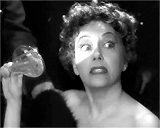
"Cameras!?"
|
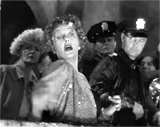
"I'm ready."
|
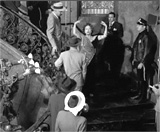
Descending the Staircase
|
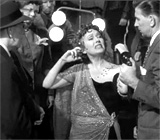
"I can't go on with the scene. I'm too happy."
|
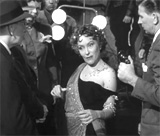
"All right, Mr. De Mille, I'm ready for my
close-up."
|
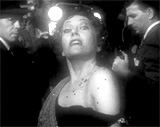
Out-of-Focus Fade to Black
|
- she paused before she made her last great "entrance" and
comeback scene. She regally made a grand descent of her staircase
inside her mansion - madly deluded and disoriented, she spoke the
film's final words, as police, cameramen and press corps reporters
waited to take her away:
I can't go on
with the scene. I'm too happy. Mr. DeMille, do you mind if I say
a few words? Thank you. I just want to tell you all how happy I am
to be back in the studio making a picture again! You don't know how
much I've missed all of you. And I promise you I'll never desert
you again. Because after Salome we'll make another picture and another
picture! You see, this is my life. It always will be! There's nothing
else - just us - and the cameras - and those wonderful people out
there in the dark. All right, Mr. De Mille, I'm ready for my close-up.
- at film's end, there was a slow out-of-focus fade
out to black on Norma's face as she approached the camera
|


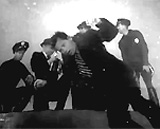
Joe Gillis (William Holden) Dead in Swimming Pool
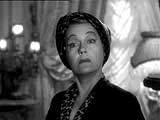
Norma: "I am big - it's the
pictures that got small"

Vampish-Looking Norma Desmond


Watching Her Silent Movies: "We didn't need dialogue. We
had faces"
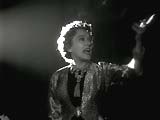
Norma: "I'll be up there again, so help me!"
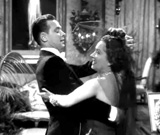
Dancing on New Years' Eve with Norma
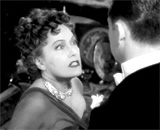
Norma's Upset About Joe's Decision to Leave Her on New Years' Eve
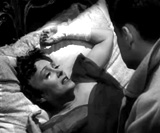
After Norma's Suicide Attempt
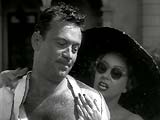
"Kept Man" Joe with Norma at the Swimming Pool
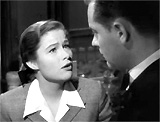
Betty (Nancy Olson) Suggesting to Joe That They Collaborate on a Script Together
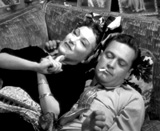
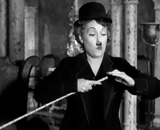
Norma Entertaining Joe
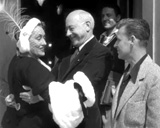
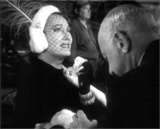
Meeting Cecil B. De Mille on the Film Set
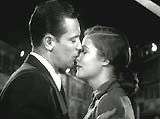
Joe Kissing Betty on the Nose
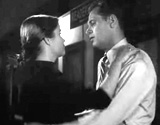
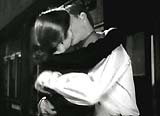
Joe's Brief Love Affair With Betty While Working Together
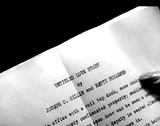
Betty's and Joe's Script: UNTITLED LOVE STORY
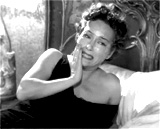
Norma - Tormented by Joe's Relationship with Betty
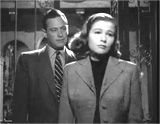
Joe's Sad Goodbye to Betty in Norma's Mansion
|
























